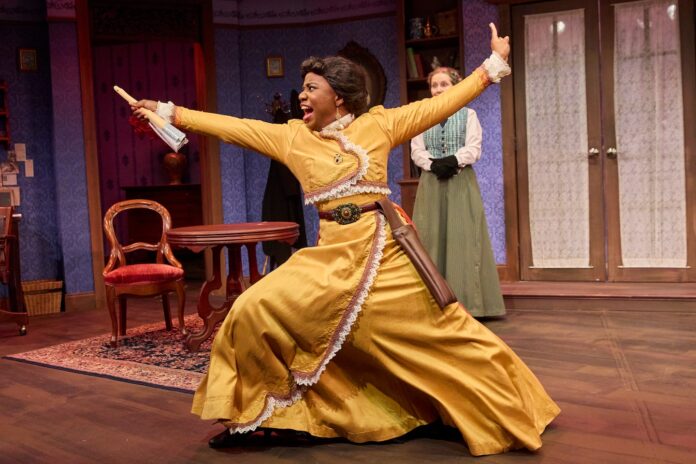Not unlike Smalls’s sly reinvention of fan etiquette, playwright Patricia Milton brings gleeful subversiveness to 19th-century mystery tropes in this play, which reimagines an Arthur Conan Doyle-style crime tale through a contemporary “she persisted” lens. With director Morgan Duncan hitting a pleasant tonal balance between suspense and jokiness in this Washington Stage Guild production, billed as an area premiere, the patriarchy gets needled; the red herrings multiply; and the game stays reliably afoot.
Scenic designer Megan Holden gives the show an atmospheric head start with the parlor set, complete with patterned wallpaper, a mantelpiece and that staple of detective-story entertainment: a crazy wall, bristling with tacked-up papers. The parlor is the hangout of Loveday Fortescue (Jen Furlong, exuding brusque energy) and Valeria Hunter (Laura Giannarelli, drolly flustered and preening), sisters who run a boardinghouse for single women in 1893 London. The siblings are involved in volunteer activities such as the Rational Dress League. (No more bustles!) Still, they have time on their hands.
So when the police fail to stop a serial killer who’s preying on actresses, the sisters and their boarder Smalls join forces to investigate. Along the way, they tangle with a theater-district bigwig named Jasbry (Steven Carpenter, radiating dapper sleaze) as well a policeman named Crane (Carpenter, all Rule Britannia officiousness), who thinks women aren’t logical enough to be detectives. With a suspicious cat’s-meat peddler (the excellent Carpenter again, sinister and growly) lurking around, clues abound.
Stephanie Parks’s period costumes add flair, and Marianne Meadows’s lighting sometimes pools brightness and shadow to dramatic effect.
The comedy is sometimes brainy (the detectives consult Krafft-Ebing’s “Psychopathia Sexualis” for insight on the killer), sometimes broad (at one point, the women gripe about all the men they’ve seen exposing themselves on public transportation). Amid the laughs, Milton does an impressive job meting out plot twists. A serial-killer mystery can’t be easy to pull off in a small-cast play with a single set, yet the tension builds steadily here.
Milton’s piece isn’t the only recent feminist play to revisit and reinvent Victorian-sleuth territory. The local troupe We Happy Few has staged Fairlith Harvey’s “Kill the Ripper” (tagline: “A Feminist Victorian Revenge Play. Finally.”) and produced audio-play experiences (starring Crabbe) about Loveday Brooke, the all-but-forgotten female detective in Catherine Louisa Pirkis’s 1890s stories. On the national scene, Kate Hamill (one of this season’s most-produced U.S. playwrights) has penned “Ms. Holmes & Ms. Watson — Apt. 2B.” Meanwhile, the Enola Holmes franchise is going strong.
In a world that’s still all too sexist, despite interest in diversifying stories and voices, the traditional buddy team of Holmes and Watson can seem hidebound. No wonder there’s interest in turning 221B Baker Street — and adjacent 19th-century-detective territory — into less of a bachelor pad.
The Victorian Ladies’ Detective Collective, by Patricia Milton. Directed by Morgan Duncan. Set, Megan Holden; costumes, Stephanie Parks; lighting, Marianne Meadows; sound, Alli Pearson; fight choreography, Bess Kaye. About 2 hours and 15 minutes. Through Feb. 25 at the Undercroft Theatre at Mount Vernon Place United Methodist Church, 900 Massachusetts Ave. NW, Washington. stageguild.org.



